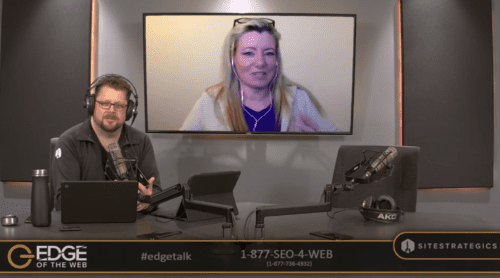Our special guest for episode 340 of the award-winning EDGE of the Web podcast was Dawn Anderson, Managing Director of Bertey. Host Erin Sparks spoke with Dawn about the impacts of natural language processing on digital marketing and SEO. Here’s what we learned:
Dawn Anderson: Her Background and Experience

Dawn Anderson is Managing Director of Bertey, a company that helps brands with web design, digital strategy and consulting, and all types of digital marketing. She is also a well-known speaker on the international SEO and digital marketing circuit including events such as Pubcon, SaaSCon, BrightonSEO, SMX (London UK and San Jose), Mozcon, and State of Search. Dawn is also a lecturer on digital marketing strategy, Search engine marketing (SEM) and marketing analytics at Manchester Metropolitan University.
Dawn has been in the SEO industry for 13 years. Before that, Dawn had an unrelated business (a building company) and in the early days when many businesses didn’t even have a website, she kept having people build her a website, but each one was awful. And then she heard about SEO and hired a few different people to do that kind of work for her and had bad experiences with them. She decided to just learn how to do it all herself and became so intrigued by it that it became her new career. After working at various agencies and on her own projects, Dawn eventually decided (seven years ago) to start her own agency: Moving Marketing. But that became so cumbersome she recently changed the name of the company to Bertey, which not only happens to be the name of her dog (a Pomeranian), but also jives well with the new focus on BERT in SEO and digital marketing.
The Promise and Challenge of SEO
There’s so much to unpack and explore when it comes to SEO, and Dawn has a great perspective on this. She understands how hard it is to keep up with the head-spinning pace of change, and yet at the same time you can’t let your focus get too narrow. The best SEOs have a broad understanding of everything that’s going on in the whole space, and that includes the rest of digital marketing as well because you have to see how it all fits together, which can’t do if you specialize in just one area.
The advantage of the SEO within digital marketing is how they have access to a massive audience before that audience is aware of a brand. In this sense, the reach of SEOs is deeper earlier on in the intent stages of consumers than most channels. The days of SEOs being hidden away in their basements working their dark arts are over. SEOs now need to also be marketers in a wider sense.
Natural Language Processing
One of the more recent developments to start having a bigger impact on SEO and digital marketing is natural language processing or NLP. This has become a big focus for Google and other search engines because they realize now that the better their search engine understands how people use language to enter their queries, the more accurate the results they can serve up, which improves the user experience. The whole BERT phenomenon at Google is related to this. BERT (Bidirectionally Encoder Representations from Transformers) helps Google’s search engine understand queries that contain multiple words with ambiguous meanings and better identify the intent of the user’s inquiry.
As Dawn notes, it’s about teaching the machines to understand how people really speak and move the industry towards conversational search. The web has three main kinds of content: the highly structured content in the form of data held in relational databases for large companies and businesses, semi-structured data in larger informational sites such as Wikipedia, and then the total hot mess of unstructured data, and it’s the unstructured data where you find the most natural language because it hasn’t been created or edited by copywriters and marketers. And that’s where you have users entering queries into search engines. And all the massive amounts of user-generated content that’s out there.
Why Does Voice Search Suck?
It can be very instructive to listen to younger digital natives and how they speak to smart devices to convey their intent and get what they want. That’s the next wave of all this. It’s all being built to cater to that next wave of rising consumers – not the rest of us. And voice search still isn’t very good, but you can bet they’re all working on improving it. Because with voice search, you want to get the right single answer. It’s not about scrolling through multiple results on one or pages on a desktop computer or laptop. That’s just not the future of search.
The main problem with voice search right now is that there’s so much conflicting data out there that it’s impossible to get any single fact right, which means offering up that single right answer is still a pipe dream at this point. Dawn offered up the following example to illustrate the challenge here:
If you Google “Which county is Twickenham in?” the answer you get will be Middlesex, but that’s wrong! Middlesex as a county was abolished years ago, there is no such thing as Middlesex Country now. Twickenham is in Greater London. But Google can’t differentiate between historic counties and current counties. This is why voice search has a long way to go before it gets better. And yet your average user is already trusting the search engine to give them the right answer! And the misinformation gets reinforced and lives on with any other website that draws on that same conflicting data and can’t understand that the county the town used to be in simply doesn’t exist anymore – but it’s alive and well all over the web! Hopefully, these discrepancies work themselves out over time, but it’s hard to see how that’s going to happen right now.
SEO in the Age of NLP
So how do SEOs optimize content in this new age of NLP? Dawn quickly notes that it’s all about optimizing based on what your users/customers need. For example, Dawn did a little experiment earlier in the day asking people to share screenshots of the most excluded URLs – and Google Search was at the top of the list. Seems counter-intuitive, right? But if you were to drill down into all these sites excluding Google, you’d probably find that they’re huge sites building tons of transactional pages, such as travel sites, booking sites, large eCommerce sites, where many of those pages simply don’t have the kind of “valuable” content Google likes to see. They’re not adding what is called a “positive network effect” in the parlance of statistics.
What you want to have on any page, whether it’s eCommerce or whatever, is the kind of content that adds value to users. And a lot of companies get this wrong. You’ll see fashion eCommerce sites adding loads to text to their pages, but that’s not the kind of content that adds value to users of the site (people shopping for clothes). For consumers, it’s all about photos and videos, not text—except for reviews. So then the mistake a lot of companies make is to prune away the informational pages they think aren’t adding value, but this could cause their transactional pages to tank if they aren’t careful. All those user-generated comments probably are adding value (if they aren’t spam), so you wouldn’t want to toss all those. In fact, that messy, user-generated content could very well be adding more value than the most carefully-crafted SEO content! It’s all about to understand what will bring value to your audience.
The real trick is to avoid over-optimizing because that can quickly start to become very unnatural and people will see through that right away. Instead, you want to focus on just providing a clear semantic structure to a page. Small sites should focus on a clear, relatively simple structure, and then open up the floodgates of user-generated content to allow for that organic natural growth and patterning of comments. It’s all about engaging users and adding value for them. When you try to over-manipulate or game the system, you will inevitably fail. Just keep it natural and full of added value!
Connect with Dawn Anderson and Bertey
Twitter: @dawnieando (https://twitter.com/dawnieando)
LinkedIn: https://www.linkedin.com/in/msdawnanderson
Bertey Web: https://bertey.com
Bertey Twitter: @BeBertey (https://twitter.com/BeBertey)
Bertey Facebook: @BeBertey (https://www.facebook.com/BeBertey)
Where Does Your Digital Marketing ROI Stand?
When you want to get a better grip on your digital marketing ROI, you can count on a Site Strategics report examining your SEO, content, social media, and PPC. Visit https://edgeofthewebradio.com/roi to get 30% off a comprehensive review of your digital assets!


